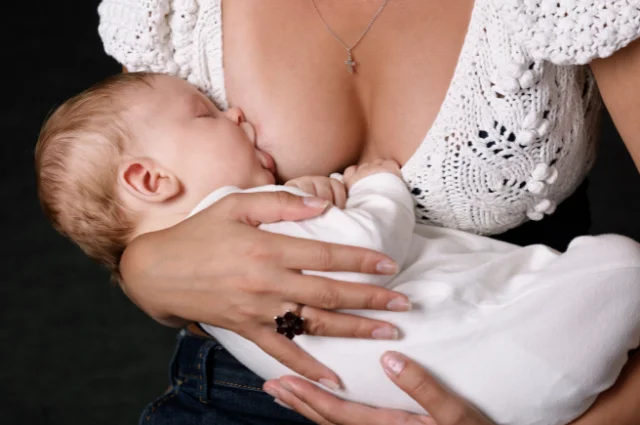Is salty breast milk safe for a baby? Breast milk is your baby’s royal food through her first series of months. It delivers everything your baby needs in nutrition, vitamins, minerals, and other essentials. The milk can be expressed for as long you want and can be pumped in a storage bottle for later use if you are a working mum.
Hey! By the way… any links on this page that lead to products on Amazon are affiliate links and I earn a commission if you make a purchase. Thanks in advance – I really appreciate it! .
Feeding your baby with salty breast milk is not necessarily unsafe. You should however know that the salty taste can be done away with, and you should seek to do that as soon as possible.
Why Does Breast Milk Taste Salty?
High sodium and chloride content has the potential to make breast milk taste salty. Below are what causes breast milk to taste salty.
- Mastitis
- Blocked Ducts
- Exercise
- Medications
- Mastitis
Mastitis is one of the causes of salty breastmilk. It is an infection of the tissue of the breast, and it occurs most frequently during the course of breastfeeding. It can happen when bacteria, usually from the baby’s mouth, enter a milk duct through a space in the nipple.
Breast infections like mastitis usually happen one to three months after childbirth, and can also occur in women who have not given birth recently, and in women who have reached menopause. About 1% -3% of breastfeeding mothers have mastitis. Two things that can contribute to the issue and complicate the symptoms are engorgement and incomplete breast emptying.
Chronic mastitis happens to women who are not necessarily breastfeeding. In women who have grown past menopause, breast infections can be associated with critical inflammation of the ducts below the nipple.
Hormonal alterations in the body can clog the milk ducts with dead skin cells and debris. These clogged ducts increase the exposure of the breast to bacterial infection.
- Blocked Ducts
Blocked ducts can also be the reason your breast milk is salty. And below are the symptoms
Symptoms of a blocked duct
Blocked milk ducts result when a milk duct in your breast becomes blocked or has poor drainage. You are very likely to experience this if your breast is not completely emptied after a feed, if your baby misses a feed, or if you are very much stressed. Symptoms can be gradual, usually affect just one breast. Below are symptoms and experiences associated with blocked ducts:
- A lump in a particular area of your breast
- Engorgement about the lump
- Pain or swelling near the lump
- Discomfort that declines after feeding/pumping
- Pain in the course of letdown
- Movement of the lump with time
An impermanent decrease in your milk supply is another common symptom of a blocked duct. Do not be surprised if you see thickened or fatty milk while you express it, that’s part of the symptoms too.
Salty breast milk caused by weaning
When you are weaning your baby and the breast milk supply starts going down, the breast milk will taste salty. This is because there will be less supply of the foremilk which has lots of sweet lactose. When this happens, the breast milk becomes more concentrated and salty. This is known as weaning milk.
- Exercise
The accumulation of lactic acid in your body alongside the saltiness of perspiration on your breasts from thorough exercise can modify the taste of your breast milk. To mitigate this effect, you can keep your exercise at a low level, or better still, wash the sweat off your breast before you start feeding your baby.
- Medications:
Some medications have the potential to alter the taste of your breast milk. If after starting a new medication, you observe that your baby is not breastfeeding as well as she should, that could be a red flag. And you might want to talk to your doctor about it.
What Does Breast Milk Taste Like?
Generally, the taste of breast milk is considered sweet and creamy with a tantalizing flavor. But of course, when it comes down to the flavors you like and dislike, the experience is always subjective. Lots of things factor into the taste, such as genetics, culture, and even exposure.
Why Is Breast Milk Sweet and Creamy?
Have you ever wondered why breast milk is sweet and creamy, you are not alone; Breast milk is sweet and creamy because it features the milk sugar lactose. Although, there are other sweeter sugars than lactose, when there is so much of it, the sweetness is always multiplied.
Because lactose features as one of the key ingredients in breast milk, it comes across in great concentrations and sweetens the flavor of breast milk. This said, breast milk also contains fat. The quantity of fat in it is what determines how creamy it is.
When the breast milk begins to flow from the breast, the fat that comes with it at that point is negligible. It may first look thin and watery, but as the milk continues to flow, the fat content increases, and so does the creaminess.
What Gives Breast Milk its Taste?
Breast milk is sweet and creamy, its flavor usually is a collection of your everyday food. If you eat a balanced diet rich in fruits and vegetables, you are doing your baby a big help, because by eating these healthy foods, you are letting your baby have healthy tastes of foods, too.
As your baby courses through life, and advances in stature and age, experts are of the opinion that they have a greater propensity towards the foods that you have fed them with via your breast milk.
Your breast milk is the perfect bridge between your baby’s present feeding habits, and the ones you want her to have as she grows up. So, it is always better to start them on a foundation of healthy foods through your breast milk.
How to Get Rid of Saltiness in Breast Milk
If you want to get rid of saltiness in your breast milk, try to express or pump for as long as you can, especially if the baby won’t take one of your breasts. Also add carrots, garlic, balsamic and minty deserts to your diets to help make your breast milk taste sweeter.
Is salty breast milk safe for babies? The Bottom Line
As we have earlier pointed out, certain things can factor into a change in the taste of your breast milk. And there is really no serious problem, you only need to be cautious and know when to say no. Note that it is okay to feed your baby with your salty breast milk. It is just that your baby may refuse to nurse on the infected breast. Do see your doctor, anyway.
Check out the Ultimate Breastfeeding class to become a pro at breastfeeding within 90 minutes!

